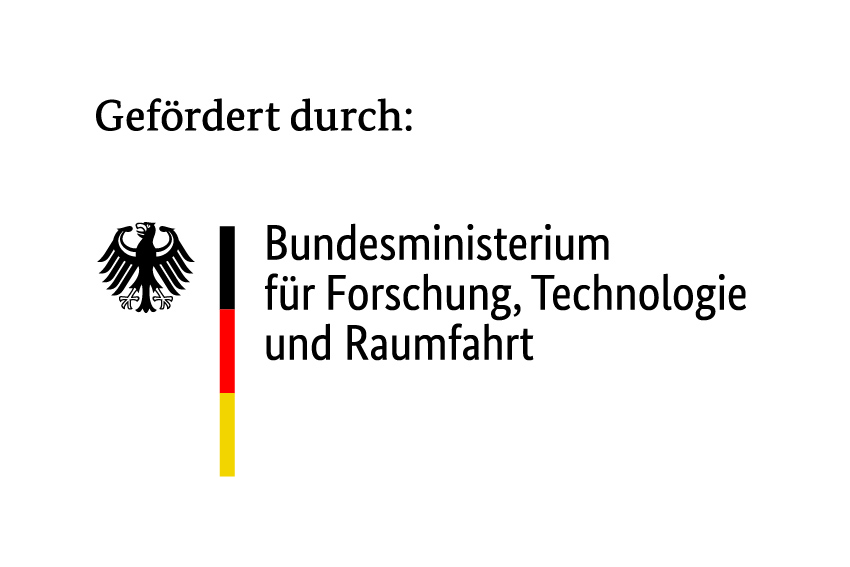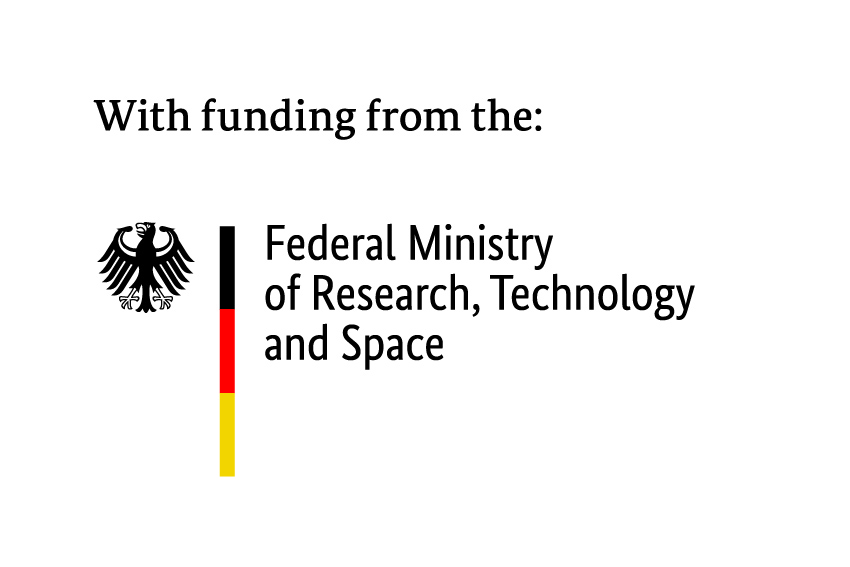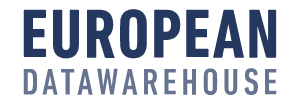Green Auto Securitization
GAS
Das Verbundprojekt „Green Auto Securitization“ (GAS) hat zum Ziel, Erkenntnisse für die Gestaltung zukünftiger grüner Autopolitik und deren Auswirkung auf das Risikomanagement europäischer Finanzinstitute zu liefern. Maßgebend für das Projekt ist die empirische Analyse von verbrieften Autokrediten und -leasings (Auto ABS) im Hinblick auf nachhaltigkeitsbezogene Daten, Fundamentalwerte von Fahrzeugen und Kreditrisiken.
Das Projekt besteht aus zwei Teilprojekten.
Teilprojekt 1: Analyse und Definition von transparenten Nachhaltigkeitsfaktoren und standardisierten Methoden für die Definition von grünen Finanzprodukten in der Automobilbranche
Das erste Teilprojekt analysiert und definiert transparente Nachhaltigkeitsfaktoren und standardisierte Methoden für die Definition von grünen Finanzprodukten in der Automobilbranche. Hierbei wird insbesondere die Rolle der Finanzmärkte und der Umweltregulierung untersucht sowie ein Rahmen für zwei neue grüne Finanzprodukte erarbeitet.

Prof. Dr. Loriana Pelizzon
Teilprojekt 2: Aufbau einer Modelldatenbank aus vier Blöcke
Das zweite Teilprojekt baut eine Modelldatenbank mit Informationen auf Fahrzeug- und Herstellerebene auf. Diese besteht aus vier Blöcken: (i) den Nachhaltigkeitsmerkmalen der Fahrzeughersteller, (ii) den Merkmalen der Automodelle, (iii) den Informationen über Autokredite und (iv) den Merkmalen der Verbriefungsprodukt

Publikationen von GAS
GAS I How to Green the European Auto ABS Market - A Literature Survey
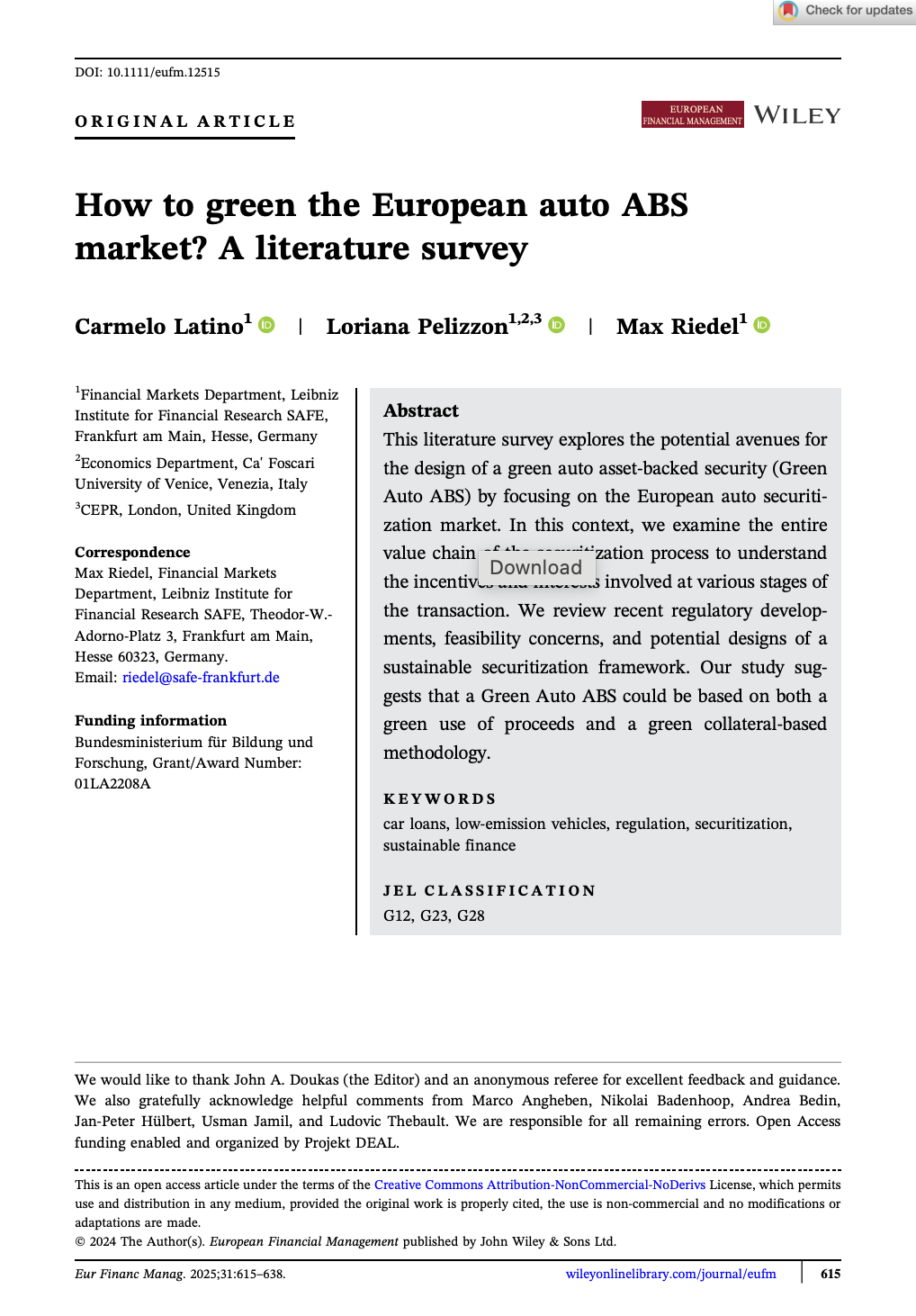
How to Green the European Auto ABS Market? A Literature Survey
This literature survey explores the potential avenues for the design of a green auto asset-backed security (Green Auto ABS) by focusing on the European auto securitization market. In this context, we examine the entire value chain of the securitization process to understand the incentives and interests involved at various stages of the transaction. We review recent regulatory developments, feasibility concerns, and potential designs of a sustainable securitization framework. Our study suggests that a Green Auto ABS could be based on both a green use of proceeds and a green collateral-based methodology.
- Veröffentlichungsdatum: 06.07.2023
- Autor:innen: Carmelo Latino, Loriana Pelizzon & Max Riedel
- Publikationsart: Working Paper
- Link zur Publikation
GAS I Fragmented EU Car Labels: How To Achieve Consumer-Friendly Standardisation and Transparency?
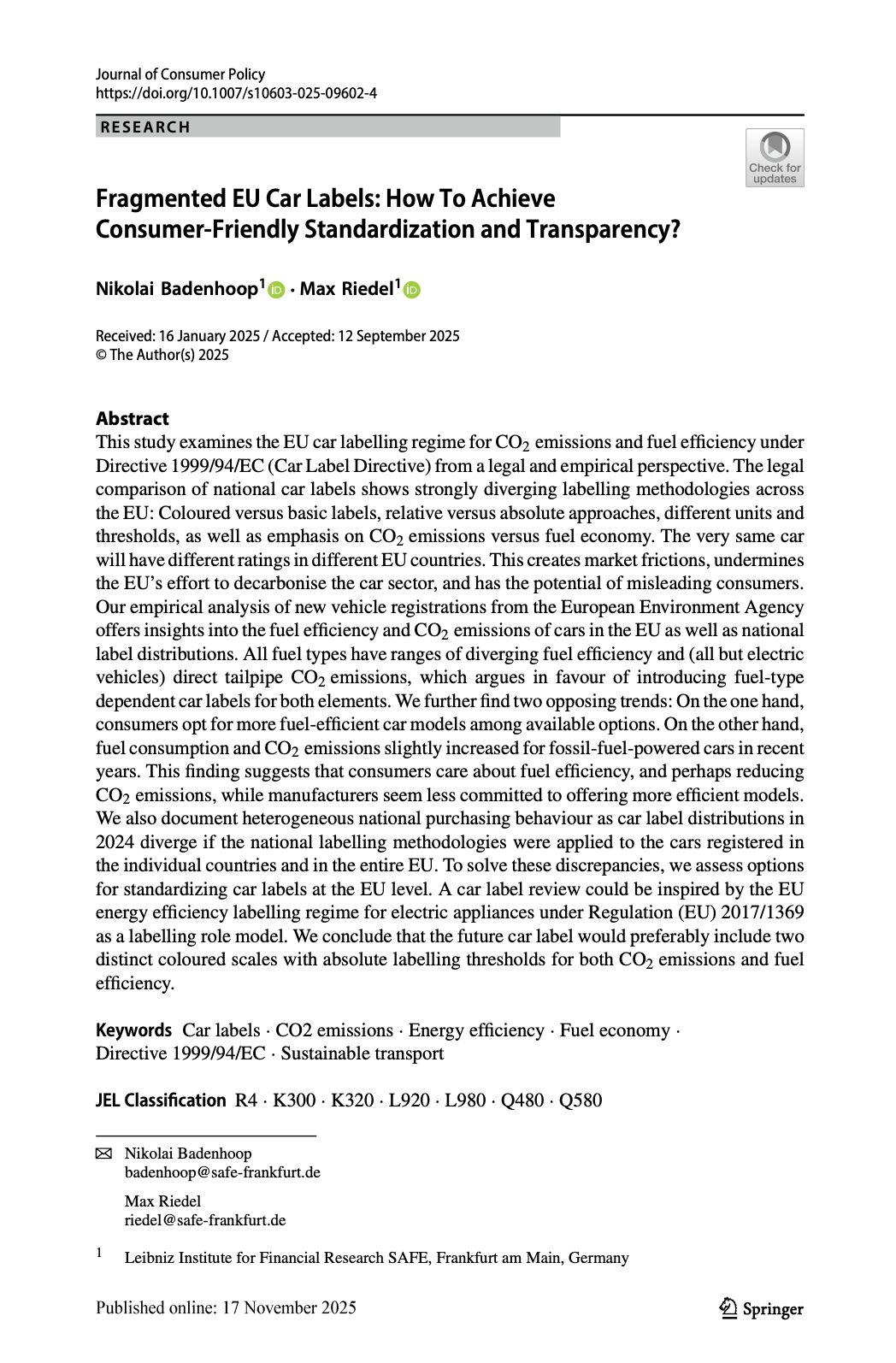
Fragmented EU Car Labels: How To Achieve Consumer-Friendly Standardisation and Transparency?
This study examines the EU car labelling regime for emissions and fuel efficiency under Directive 1999/94/EC (Car Label Directive) from a legal and empirical perspective. The legal comparison of national car labels shows strongly diverging labelling methodologies across the EU: Coloured versus basic labels, relative versus absolute approaches, different units and thresholds, as well as emphasis on emissions versus fuel economy. The very same car will have different ratings in different EU countries. This creates market frictions, undermines the EU’s effort to decarbonise the car sector, and has the potential of misleading consumers. Our empirical analysis of new vehicle registrations from the European Environment Agency offers insights into the fuel efficiency and emissions of cars in the EU as well as national label distributions. All fuel types have ranges of diverging fuel efficiency and (all but electric vehicles) direct tailpipe emissions, which argues in favour of introducing fuel-type dependent car labels for both elements. We further find two opposing trends: On the one hand, consumers opt for more fuel-efficient car models among available options. On the other hand, fuel consumption and emissions slightly increased for fossil-fuel-powered cars in recent years. This finding suggests that consumers care about fuel efficiency, and perhaps reducing emissions, while manufacturers seem less committed to offering more efficient models. We also document heterogeneous national purchasing behaviour as car label distributions in 2024 diverge if the national labelling methodologies were applied to the cars registered in the individual countries and in the entire EU. To solve these discrepancies, we assess options for standardizing car labels at the EU level. A car label review could be inspired by the EU energy efficiency labelling regime for electric appliances under Regulation (EU) 2017/1369 as a labelling role model. We conclude that the future car label would preferably include two distinct coloured scales with absolute labelling thresholds for both emissions and fuel efficiency.
- Veröffentlichungsdatum: 16. Januar 2025
- Autor:innen: Nikolai Badenhoop und Max Riedel
- Publikationsart: Paper
- Link zum PDF-Dokument
GAS I From Deletion to Substitution: A Smart Regulatory Path for EU Securitisation Reform
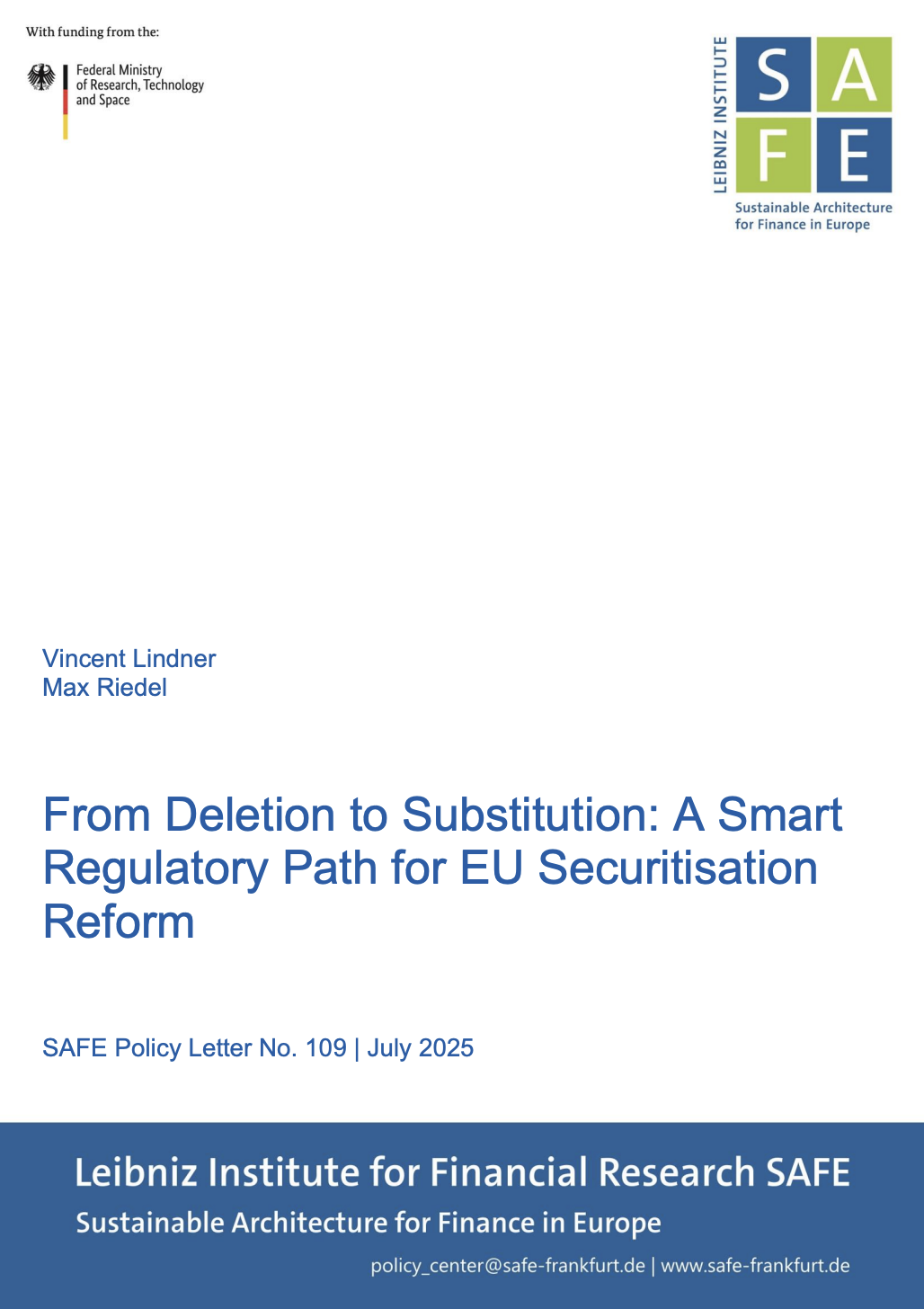
From Deletion to Substitution: A Smart Regulatory Path for EU Securitisation Reform
This policy letter critically assesses the European Commission’s proposed revisions to the Securitisation Regulation, which aim to simplify disclosure requirements by reducing reporting fields by at least 35%. While the Commission frames this as a step toward cutting red tape, this quantitative approach risks undermining the core function of securitisation reporting: to ensure transparency and enable effective risk assessment. We argue that politically expedient deregulation overlooks key qualitative dimensions of financial supervision. Using the case of auto asset-backed securities (ABS), we propose a costeffective alternative that reduces administrative burden while enhancing information depth. Specifically, we demonstrate that the mandatory reporting of just two existing vehicle identifiers can yield highly granular and reliable vehicle data. Using public datasets from the European Environment Agency, we show that these identifiers can reproduce or surpass the current data quality for key vehicle characteristics, including CO₂ emissions, fuel type, and engine power. We conclude that regulatory simplification should aim for intelligent substitution rather than deletion.
- Veröffentlichungsdatum: Juli 2025
- Autor:innen: Vincent Lindner und Max Riedel
- Publikationsart: Policy Letter
- Link zum PDF-Dokument
GAS I Mutual Funds’ Appetite for Sustainability in European Auto ABS

Mutual Funds’ Appetite for Sustainability in European Auto ABS
Using hand-collected data on European auto asset-backed securities (Auto ABS), we examine the role of mutual funds in financing the transition to zero-emission mobility. Mutual funds, particularly those with a green mandate, tend to have a higher exposure to sustainability-transparent Auto ABS and tend to allocate more capital to deals with a higher proportion of electric vehicles. However, we find no clear preference for portfolios with lower average CO2 emissions. This behaviour suggests that, in the absence of a globally recognized framework for green securitizations, asset managers rely on sustainability proxies that are associated with the lowest disclosure processing costs. Our analysis provides important new evidence on how standardized sustainability disclosures at both the prospectus and loan levels could influence asset allocation.
- Veröffentlichungsdatum: 25. April 2025
- Autor:innen: Carmelo Latino, Loriana Pelizzon, Max Riedel und Yue Wang
- Publikationsart: Working Paper
- Link zum PDF-Dokument
GAS I Vehicle identifiers: the key to jumpstarting the European Green Auto ABS market?
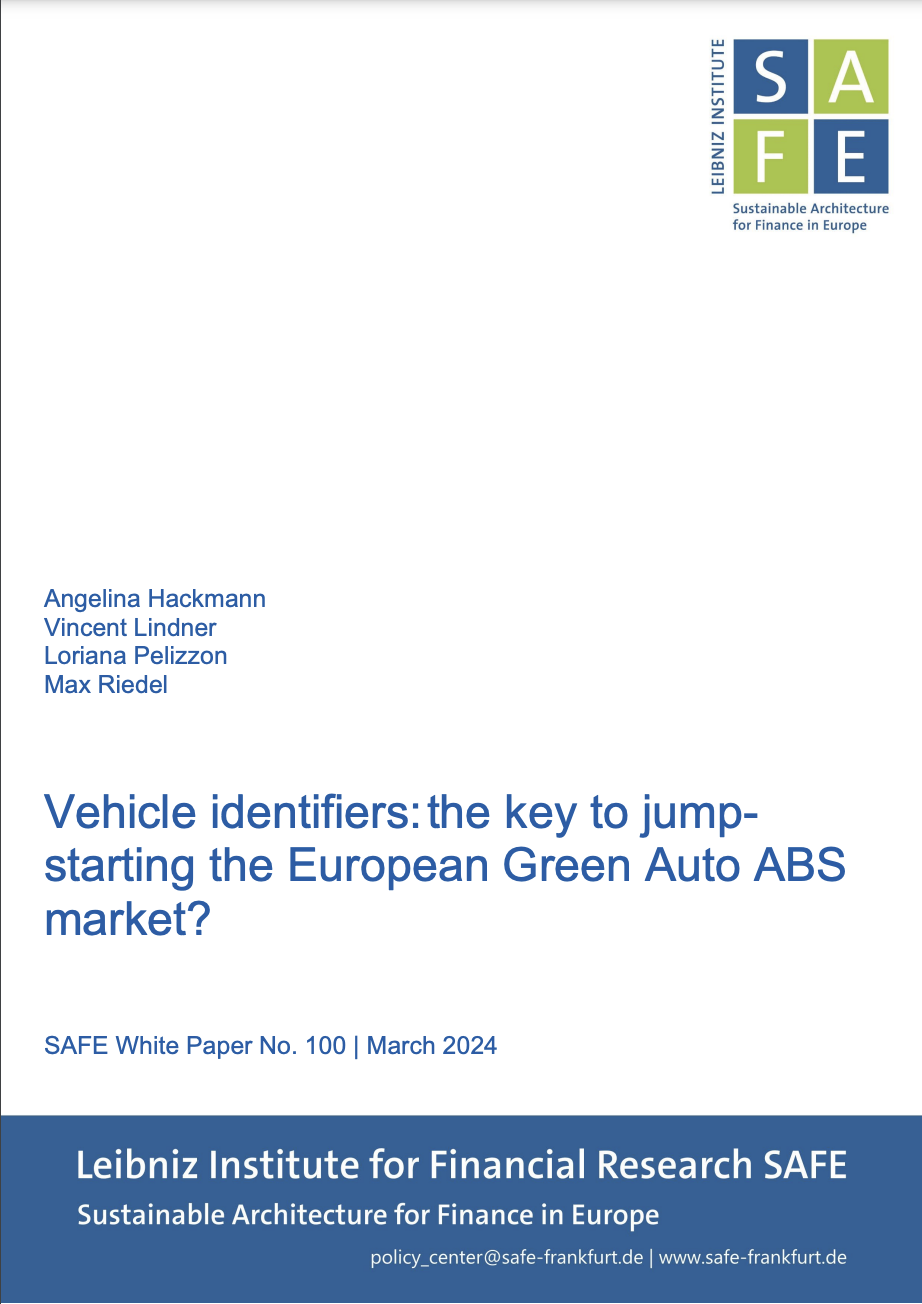
Vehicle identifiers: the key to jumpstarting the European Green Auto ABS market?
This paper addresses the need for transparent sustainability disclosure in the European Auto Asset-Backed Securities (ABS) market, a crucial element in achieving the EU's climate goals. It proposes the use of existing vehicle identifiers, the Type Approval Number (TAN) and the Type-Variant-Version Code (TVV), to integrate loan-level data with sustainability-related vehicle information from ancillary sources. While acknowledging certain challenges, the combined use of TAN and TVV is the optimal solution to allow all stakeholders to comprehensively assess the environmental characteristics of securitised exposure pools in terms of data protection, matching accuracy, and cost-effectiveness.
- Veröffentlichungsdatum: März 2024
- Autor:innen: Angelina Hackmann, Vincent Lindner, Loriana Pelizzon & Max Riedel
- Publikationsart: White Paper
- Link zum PDF-Dokument
